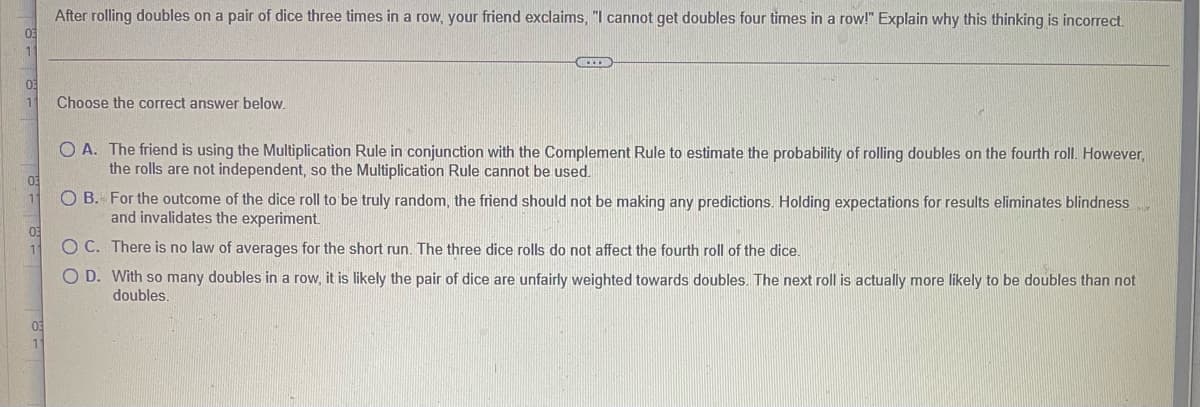After rolling doubles on a pair of dice three times in a row, your friend exclaims, "I cannot get doubles four times in a row!" Explain why this thinking is incorrect. Choose the correct answer below. O A. The friend is using the Multiplication Rule in conjunction with the Complement Rule to estimate the probability of rolling doubles on the fourth roll. However, the rolls are not independent, so the Multiplication Rule cannot be used. O B. For the outcome of the dice roll to be truly random, the friend should not be making any predictions. Holding expectations for results eliminates blindness and invalidates the experiment. O C. There is no law of averages for the short run. The three dice rolls do not affect the fourth roll of the dice. O D. With so many doubles in a row, it is likely the pair of dice are unfairly weighted towards doubles. The next roll is actually more likely to be doubles than not doubles.
After rolling doubles on a pair of dice three times in a row, your friend exclaims, "I cannot get doubles four times in a row!" Explain why this thinking is incorrect. Choose the correct answer below. O A. The friend is using the Multiplication Rule in conjunction with the Complement Rule to estimate the probability of rolling doubles on the fourth roll. However, the rolls are not independent, so the Multiplication Rule cannot be used. O B. For the outcome of the dice roll to be truly random, the friend should not be making any predictions. Holding expectations for results eliminates blindness and invalidates the experiment. O C. There is no law of averages for the short run. The three dice rolls do not affect the fourth roll of the dice. O D. With so many doubles in a row, it is likely the pair of dice are unfairly weighted towards doubles. The next roll is actually more likely to be doubles than not doubles.
Chapter8: Sequences, Series,and Probability
Section8.7: Probability
Problem 4ECP: Show that the probability of drawing a club at random from a standard deck of 52 playing cards is...
Related questions
Question
100%

Transcribed Image Text:After rolling doubles on a pair of dice three times in a row, your friend exclaims, "I cannot get doubles four times in a row!" Explain why this thinking is incorrect.
03
1
Choose the correct answer below.
O A. The friend is using the Multiplication Rule in conjunction with the Complement Rule to estimate the probability of rolling doubles on the fourth roll. However,
the rolls are not independent, so the Multiplication Rule cannot be used.
03
O B. For the outcome of the dice roll to be truly random, the friend should not be making any predictions. Holding expectations for results eliminates blindness
and invalidates the experiment.
O C. There is no law of averages for the short run. The three dice rolls do not affect the fourth roll of the dice.
O D. With so many doubles in a row, it is likely the pair of dice are unfairly weighted towards doubles. The next roll is actually more likely to be doubles than not
doubles.
03
Expert Solution
This question has been solved!
Explore an expertly crafted, step-by-step solution for a thorough understanding of key concepts.
This is a popular solution!
Trending now
This is a popular solution!
Step by step
Solved in 2 steps

Recommended textbooks for you

